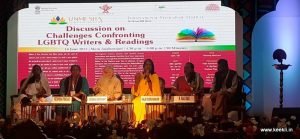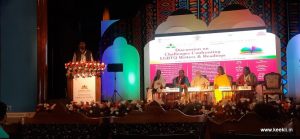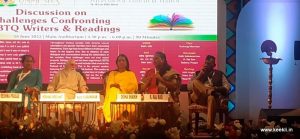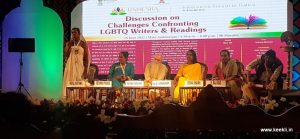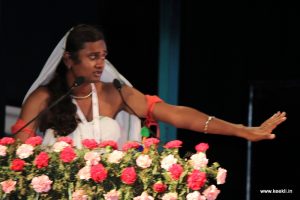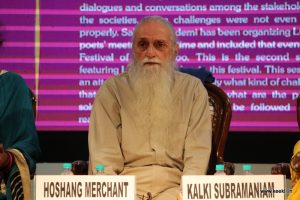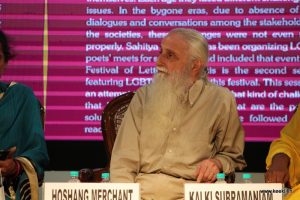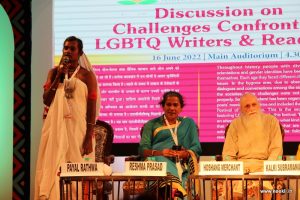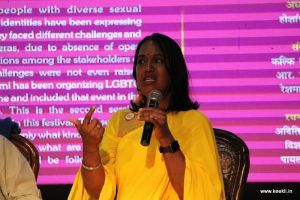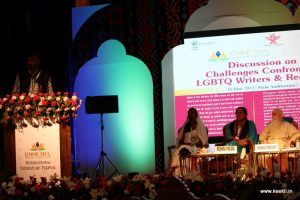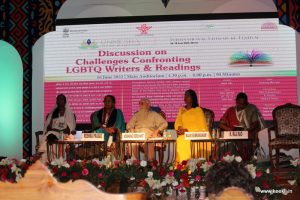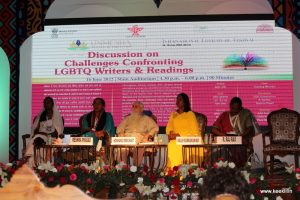
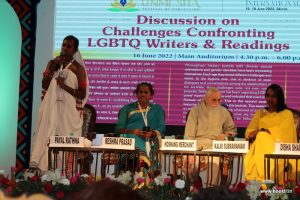 Unmesha, the International Literature Festival organised by Sahitya Akademi has welcomed prestigious and diverse cultures from pan India, along with eminent personalities to share their knowledge about how life shaped them into authors, poets and anthologists. Not only this, the phonetics have been assured to be provided with the best of content, when diving deep across genres and interests. One such discussion was on Challenges Confronting LGBTQ Writers and Reading. The panel consisted of eminent personalities, namely Payal Rathwa, Reshma Prasad, Hoshang Merchant, Kalki Subramanium and R Raj Rao. Chaired by Hoshang, each discussant expressed his/her views with passion and what it means to them when people talk about LGBTQAI+ community and the challenges they face as writers. (Click for Part II – Readings by LGBTQ Writers)
Unmesha, the International Literature Festival organised by Sahitya Akademi has welcomed prestigious and diverse cultures from pan India, along with eminent personalities to share their knowledge about how life shaped them into authors, poets and anthologists. Not only this, the phonetics have been assured to be provided with the best of content, when diving deep across genres and interests. One such discussion was on Challenges Confronting LGBTQ Writers and Reading. The panel consisted of eminent personalities, namely Payal Rathwa, Reshma Prasad, Hoshang Merchant, Kalki Subramanium and R Raj Rao. Chaired by Hoshang, each discussant expressed his/her views with passion and what it means to them when people talk about LGBTQAI+ community and the challenges they face as writers. (Click for Part II – Readings by LGBTQ Writers)
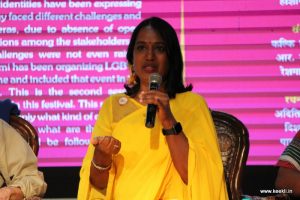 Kalki narrated her poem Kuri and then explained it, which was published in the year 2000 and was considered to be controversial. She explained that Kuri, in Tamil means a phallus (penis), while arunte, means smearing or cutting it. The nutshell of the poem revolved around the fact, thus expressing how she evolved as a personality, after her sex reconstruction surgery; and that how tough conceiving is, as a woman of other time. She also shared that no matter what the society labels her as, she feels the consciousness of a woman, residing inside of her. She stated that she published another book last year titled, We Are Not the Others, wherein she explained about the plight of transgenders at the mercy of people who exclude them from the society, based on a monologue, My Perfectly Imperfect Vagina.
Kalki narrated her poem Kuri and then explained it, which was published in the year 2000 and was considered to be controversial. She explained that Kuri, in Tamil means a phallus (penis), while arunte, means smearing or cutting it. The nutshell of the poem revolved around the fact, thus expressing how she evolved as a personality, after her sex reconstruction surgery; and that how tough conceiving is, as a woman of other time. She also shared that no matter what the society labels her as, she feels the consciousness of a woman, residing inside of her. She stated that she published another book last year titled, We Are Not the Others, wherein she explained about the plight of transgenders at the mercy of people who exclude them from the society, based on a monologue, My Perfectly Imperfect Vagina.

R Raj Rao, who is considered to be one of the most noted writers amongst the LGBTQ community, emphasised on the fact that an individual representing any of the community, should not be speaking on the basis of limited avenues, known about the functionalities of a community. It is often known as epistemic, which means creating violence by presenting views on behalf of some other community one isn’t representing. In continuation of the events, where notable writers shared their view points with their audience, Reshma Prasad was also one of them, who recited a poem on langik azadi, which means the freedom to choose one’s sexuality and ethnicity. She also presented forth her view point on the importance of inclusion of transgenders amongst the norms of the ongoing society. Towards the end, she concluded by thanking the organising committee for providing her with a platform of speaking to their audience and spreading awareness regarding the normality of accepting transgenders in any role of profession.

While many members of the LGBTQ community took pride in educating the audience with their experiences, on the same lapse of shareability, there was Payal Rathwa, who shared her grief and angst against those in power, openly. She started off by narrating life as a tribal person, and then stated that when she came to pursue the life of a civilian, by taking up a course on agriculture, she was innocent, lost and pure enough to not even being able to figure out which transport to take according to her convenience. She further expressed that due to lack of funds and acceptability, she even had to sleep on the footpath, for good three days. She also questioned the authorities by raising the burning topic of unemployment amongst the LGBTQ community. Her grief on opening up was, that even after holding a valid degree, she was unable to earn and become independent. Down the painful memory lane, she got emotional expressing that she had to work as a prostitute, to serve herself during the covid times, followed by personal experiences of exclusion she encountered, back at college. She was determined enough to not let her determination to fight for the community become any less, by stating that they are not wrong in any way. Instead, she infused a feeing of mutual respect for the community and requested the general public to be little more sensitive towards the community. Not only this, she also asked those in authority to amend the employment policies for those of different time and gender. Her main agenda was to tell people that the urge of being a man or woman is not known, rather needs to be left to the possessor of the body.

Disha Pinky Sheikh spoke about the reputation, members of the society hold, about the transgenders. She stated that transgenders are married to God. Hence, when we consider God as our father, transgenders are mother equivalents in that regard. Transgenders should be seeked with respect and not with disgust. She emphasised more on writing about important concerns, related to the reputation and prestige of the transgender community should hold as a whole.

Kalki ended the discussion by reciting few lines from her infamous book, We Are Not the Others, that stated the joys and pains of belonging to a different community, yet, touching divinity as normality at most stances.



